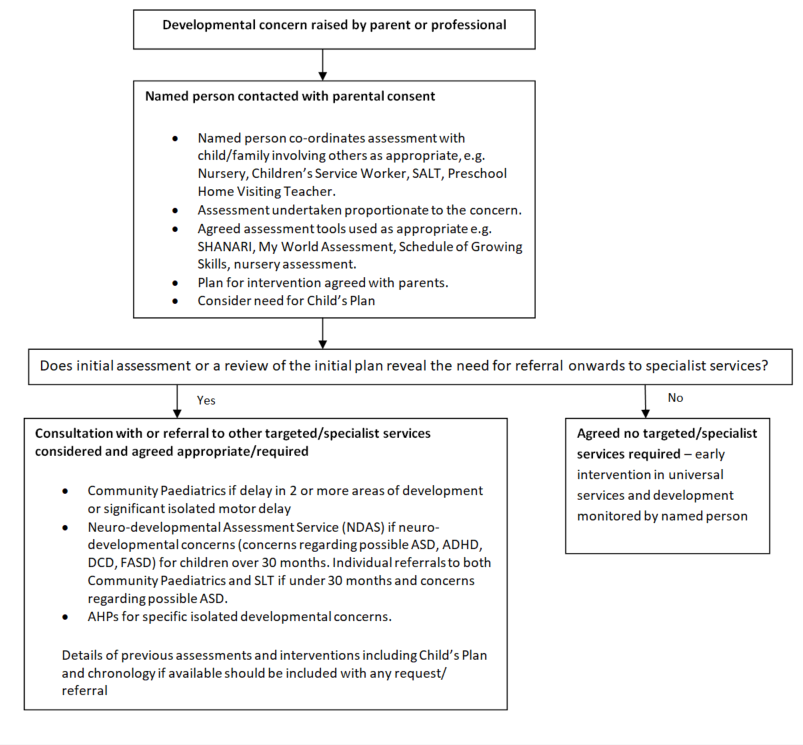- Medical (hospital-based) Paediatrics accepts referrals of children up to 16 years old.
- Requests for assistance to partner agencies such as Occupational Therapy, Physiotherapy, and Speech and Language Therapy for children can be made directly to the departments involved following the Guidance for making a request for assistance
- Some – but not all - hospital specialities will accept paediatric referrals – see below for details.
- Separate guidance is available for Child and Adolescent Mental Health Services (CAMHS).
The present document provides guidance on appropriate referral routes in areas where there may be uncertainty. We do not intend to restrict freedom of referral, or to undermine management in the primary care setting.
How appropriate? How urgent?
Both the above departments will be happy to discuss by phone the appropriateness or urgency of any referral. There are however, some circumstances where telephone contact is essential:
- Children with newly diagnosed diabetes. Same-day admission is usually appropriate
- Children with a high suspicion of malignancy – same day discussion with the consultant on call for Medical Paediatrics.
- There is a rota for advice on suspected child abuse (physical, sexual, or emotional). Telephone switchboard (01463 704000) and ask them to activate the bleep for child protection. Your call may be taken by a secretary, who will arrange for the appropriate consultant to call you back. In an emergency situation advice can also be obtained from social work and police. If the child is ill or has sustained significant injury, ward admission can be arranged through Medical Paediatrics – contact the consultant on call directly.
Departments providing a specific paediatric service
- Medical paediatric referral is appropriate for most children whose problems involve the respiratory system, cardiovascular system, alimentary system, genitourinary system, endocrine system, and growth. Further referral to specialist gastroenterology, endocrine, neurology, urology and cardiac clinics can be made by the consultant paediatrician (either hospital or community based). Guidance on the referral to surgical services is given later in this document.
- Acute problems relating to the central nervous system, including suspected epilepsy in the previously well child, should be referred to medical paediatrics.
- Children with chronic central nervous system disorders are usually cared for by Community Paediatrics, including those with cerebral palsy and neuromuscular disorders. Community Paediatrics will undertake the investigation and treatment of children under their care in whom epilepsy is suspected.
- Children with significant developmental delay, and suspected co-ordination problems, ADHD or autism spectrum disorders should be referred to Community Paediatrics.
- Emotional and behavioural problems are extremely varied. It may be appropriate, on the basis of presentation and severity, to refer to Child Psychiatry, Child Psychology or Community Paediatrics. Please see specific CAMHS guidance for details.
- Wetting and soiling/Primary nocturnal enuresis is best assessed and managed by the school nursing service. A referral form can be found on the intranet – click in turn on “organisation”, “departments”, “Paediatrics”, “useful forms”. Secondary enuresis or daytime enuresis should be referred to Medical Paediatrics.
Encopresis in childhood is often secondary to constipation. Guidance on assessment, management, and onward referral where appropriate can be found on the intranet – click in turn on “Shared clinical guidelines”, “referral guidelines”, “paediatrics”, “Constipation”. Where more detailed assessment is required, refer to Medical Paediatrics.
Departments providing a service to both adult and paediatric patients
- Dermatological problems should be referred direct to Dermatology. Where there is suspicion of an underlying systemic disease, or where psychosocial aspects may be contributory, referral to medical paediatrics may be considered.
- Suspected hearingand vision problems should be referred direct to ENT and ophthalmology respectively.
- Children with speech , language and communication difficulties should be referred direct to Speech and Language Therapy following the Guidance for making a request for assistance. Also refer to ENT where hearing problems are suspected. Children with additional learning problems and more pervasive problems should be referred to Community Paediatrics, who will engage with partner agencies as appropriate
- General surgery
Paediatric problems requiring surgical assessment or intervention, including phimosis, hernias and undescended testes should be referred direct to the surgical team. Many of these cases will be appropriately managed within General Surgery. There is in addition a Paediatric Surgery clinic which is held in Raigmore twice a month by a member of the Paediatric Surgery team from the Royal Aberdeen Children’s’ Hospital. Referrals to this clinic should be addressed to “Paediatric Surgery” at Raigmore Hospital.
- Paediatric Urology
Urological surgeons locally do not provide a paediatric service. The Paediatric Surgery clinic will accept referrals for paediatric urology including renal and bladder problems (except UTI and enuresis which should be referred to the medical team in the first instance), and hypospadias. In addition a tertiary specialist Paediatric Urology clinic is provided at Raigmore in conjunction with RACH. Referrals to this clinic would normally be made by the Paediatricians or Paediatric Surgeon.
- Plastic Surgery
There is a visiting plastic surgery clinic at Raigmore to which direct referrals can be made.
- Trauma and Orthopaedics
Skeletal and joint problems should normally be referred direct to orthopaedic surgery: - Where there appears to be an underlying neurological cause refer to Community Paediatrics
- Where arthritis is suspected, refer to Medical Paediatrics.
- Where a neoplastic cause is suspected please telephone the consultant on call for Medical Paediatrics to arrange urgent assessment.
- Gynaecology problems
- Before menarche, refer to Medical Paediatrics. A female paediatrician can be requested.
- After menarche, refer to gynaecology
- If there is a suspected child protection concern, discuss with the consultant on call for child protection (see above)
- Premature puberty should be referred to Medical Paediatrics.


